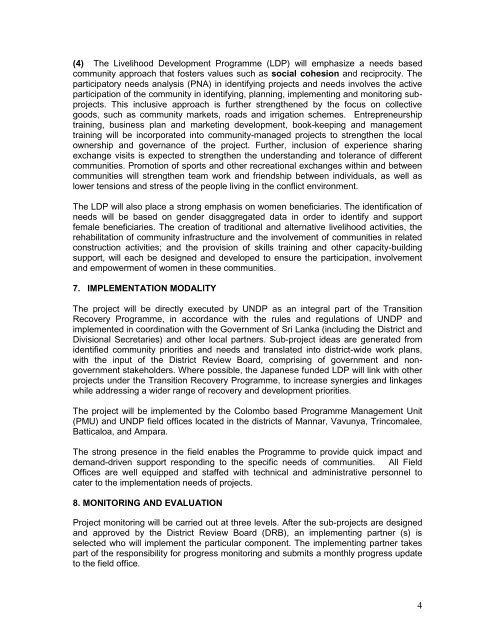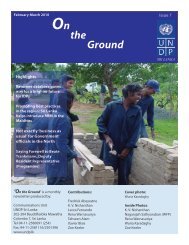Concept Paper Livelihood Development Programme (LDP ... - UNDP
Concept Paper Livelihood Development Programme (LDP ... - UNDP
Concept Paper Livelihood Development Programme (LDP ... - UNDP
Create successful ePaper yourself
Turn your PDF publications into a flip-book with our unique Google optimized e-Paper software.
(4) The <strong>Livelihood</strong> <strong>Development</strong> <strong>Programme</strong> (<strong>LDP</strong>) will emphasize a needs based<br />
community approach that fosters values such as social cohesion and reciprocity. The<br />
participatory needs analysis (PNA) in identifying projects and needs involves the active<br />
participation of the community in identifying, planning, implementing and monitoring subprojects.<br />
This inclusive approach is further strengthened by the focus on collective<br />
goods, such as community markets, roads and irrigation schemes. Entrepreneurship<br />
training, business plan and marketing development, book-keeping and management<br />
training will be incorporated into community-managed projects to strengthen the local<br />
ownership and governance of the project. Further, inclusion of experience sharing<br />
exchange visits is expected to strengthen the understanding and tolerance of different<br />
communities. Promotion of sports and other recreational exchanges within and between<br />
communities will strengthen team work and friendship between individuals, as well as<br />
lower tensions and stress of the people living in the conflict environment.<br />
The <strong>LDP</strong> will also place a strong emphasis on women beneficiaries. The identification of<br />
needs will be based on gender disaggregated data in order to identify and support<br />
female beneficiaries. The creation of traditional and alternative livelihood activities, the<br />
rehabilitation of community infrastructure and the involvement of communities in related<br />
construction activities; and the provision of skills training and other capacity-building<br />
support, will each be designed and developed to ensure the participation, involvement<br />
and empowerment of women in these communities.<br />
7. IMPLEMENTATION MODALITY<br />
The project will be directly executed by <strong>UNDP</strong> as an integral part of the Transition<br />
Recovery <strong>Programme</strong>, in accordance with the rules and regulations of <strong>UNDP</strong> and<br />
implemented in coordination with the Government of Sri Lanka (including the District and<br />
Divisional Secretaries) and other local partners. Sub-project ideas are generated from<br />
identified community priorities and needs and translated into district-wide work plans,<br />
with the input of the District Review Board, comprising of government and nongovernment<br />
stakeholders. Where possible, the Japanese funded <strong>LDP</strong> will link with other<br />
projects under the Transition Recovery <strong>Programme</strong>, to increase synergies and linkages<br />
while addressing a wider range of recovery and development priorities.<br />
The project will be implemented by the Colombo based <strong>Programme</strong> Management Unit<br />
(PMU) and <strong>UNDP</strong> field offices located in the districts of Mannar, Vavunya, Trincomalee,<br />
Batticaloa, and Ampara.<br />
The strong presence in the field enables the <strong>Programme</strong> to provide quick impact and<br />
demand-driven support responding to the specific needs of communities. All Field<br />
Offices are well equipped and staffed with technical and administrative personnel to<br />
cater to the implementation needs of projects.<br />
8. MONITORING AND EVALUATION<br />
Project monitoring will be carried out at three levels. After the sub-projects are designed<br />
and approved by the District Review Board (DRB), an implementing partner (s) is<br />
selected who will implement the particular component. The implementing partner takes<br />
part of the responsibility for progress monitoring and submits a monthly progress update<br />
to the field office.<br />
4



